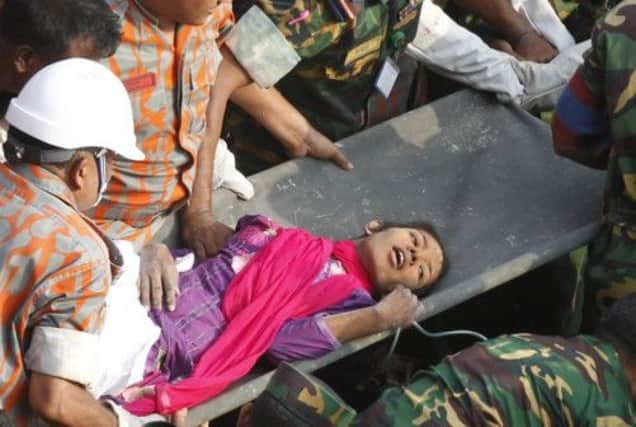Retailers sign Bangladesh safety deal


Details of factories used by the brands, including Primark and H&M, will be collected by Monday and an initial inspection programme to identify hazards and any urgent repairs will be completed in nine months.
In the meantime, any immediate threats identified by other inspections or workers will result in factories being shut down, although employees will continue to be paid, according to the accord.
Advertisement
Hide AdAdvertisement
Hide AdThe contract has been agreed between retailers, international and local trade unions and non-government organisations.
It was put in place after the collapse of the eight-storey Rana Plaza building in April, a catastrophe that focused world attention on safety standards at Bangladesh’s garment export industry, which supplies clothes for some of the world’s best-known retailers.
Primark has announced compensation for victims and their families. Some of those injured and killed in the incident in Dhaka worked for a company that supplied the brand.
Other retailers that have signed up to the agreement include Debenhams, John Lewis, Marks & Spencer, Mothercare, N Brown, New Look, Sainsbury’s and Tesco.
Its aim is to move quickly to reduce hazards facing workers, with plans for renovations and repairs to be put in place following inspections.
“These will focus on those issues that pose immediate risks to workers, in particular inadequate emergency infrastructure and procedures – for example fire exits, fire training and evacuation – and fundamental flaws that could lead to a partial or total structural failure of a factory building,” said the committee overseeing the programme.
“In the interim period, while details are being finalised and the inspectorate is being built, an emergency protocol will ensure swift action to protect workers at any factory where existing inspection programmes or worker reports identify an immediate threat to life and limb.”
In such cases, signatory companies will be notified and owners ordered to shut down pending investigation and repair, while workers will be informed of risks and their right to refuse to enter a potentially unsafe building.
Advertisement
Hide AdAdvertisement
Hide Ad“A viable plan with renovations and repairs undertaken to address the hazards will be produced and workers will be paid while the factory remains closed,” the announcement said.
Jyrki Raina, general secretary of Industriall, a global union federation which has played a key role in creating the agreement, said: “Our mission is clear: to ensure the safety of all workers in the Bangladesh garment industry.
“The direct involvement of workers in the factories is key to the success of this programme.”
Justine Greening, the International Development Secretary, welcomed the move, saying the Rana Plaza collapse “was a wake-up call about the urgent need to improve safety standards for employees in developing countries”.
She said the UK government was working with Bangladeshi authorities to offer technical support and advice on standards but UK retailers also had a role to play.
“British business must be a force for good in the developing world too, so that together we can help end aid dependency through jobs,” said Miss Greening.
Last week, she met senior figures from the British retail industry for talks on improving supply chains and ensuring clothes were produced responsibly.